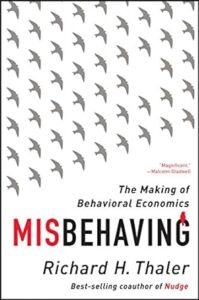Get your book here
Summary
Richard Thaler’s Misbehaving offers a captivating exploration of behavioral economics, a field that challenges the traditional assumptions of rational decision-making in economics. Thaler, a key figure in this discipline, shares his journey from questioning established economic models to helping shape a new understanding of how people actually behave in markets and everyday life.
The book delves into concepts like “mental accounting,” where people irrationally separate money into different categories, and the “endowment effect,” which explains why we overvalue what we already own. Thaler illustrates these ideas with engaging real-world examples, from sports betting to retirement savings, revealing how our decisions often stray from what classical economics would predict.
Thaler’s writing stands out for its clarity and humor, making complex theories accessible to a broad audience. He uses anecdotes and experiments to show how human behavior often defies rational expectations, all while maintaining a light, self-deprecating tone that makes the material enjoyable to read.
More than just an academic critique, the book highlights the importance of understanding human quirks to improve decision-making in business, policy, and personal finance. Thaler’s insights offer valuable lessons on why people behave the way they do and how embracing these realities can lead to better outcomes in various aspects of life.
